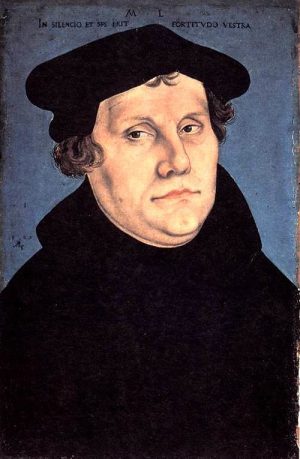
Martin Luther
Image © Depositphotos.com/ londondeposit
Did you know there is more to October 31 than pumpkins, fall festivals, dressing up, trunk-or-treats, Halloween, and candy?
Some people call October 31 Reformation Day because of what happened on that day in 1517. Reformation is the big name used to describe the period of history when different Christian denominations broke off from the Roman Catholic church. This split didn’t happen overnight.
The First Split
When the Christian church started as described in the book of Acts, there was only one Christian church. There weren’t Methodists, Seventh Day Adventists, Lutheran, Episcopalian, Baptist, Pentecostal, or any other denominations. This one church was called the catholic church. The word “catholic” means “universal.” In other words, the “catholic church” (with a lower case c) is made up of the people all over the world who trust Jesus as their Lord and Savior.
The church split for the first time in 1054 into the eastern and western church. Christians in the Middle East and Asia (the east) became known as the Greek Orthodox Church. Christians in Europe and North Africa (the west) became known as the Roman Catholic Church. The reasons for this split were geographical, cultural, and political. You can read more about it in this article by christianfaith.com.
Earn Your Way to Heaven?
Things continued this way for several hundred years. Then came the day when the Roman Catholic pope wanted to build a big, fancy church (St. Peter’s Basilica in Rome). One way he raised money to build this expensive church was to sell indulgences. Indulgences were supposed to be similar to a free pass for sin. You could buy one to have any sin forgiven for you or someone you know. Basically, people were trying to earn their way into heaven by paying money to get there. Is that what the Bible teaches?
God’s grace has saved you because of your faith in Christ. Your salvation doesn’t come from anything you do. It is God’s gift. It is not based on anything you have done. No one can brag about earning it.
Ephesians 2:8-9 (NIRV)
Martin Luther (not Martin Luther King) was a monk living at that time. Martin Luther did everything he could to get close to God and to make sure he was forgiven. He read the Bible, prayed, fasted (not eating food for a period of time), worked hard, and tried to punish himself for his sins (the wrong choices he made). He studied hard and became a professor (teacher) at Wittenberg University in Germany. He still didn’t feel like he’d done enough. He was still looking for how to please God.
People today sometimes still think like Martin Luther. They think if they just do enough good things, that will outweigh the bad and they’ll go to heaven. Some people think if they just punish themselves enough it will pay for all the bad things they do. Both of these plans try to do the same thing. Both people are trying to make things right by giving something to God (either more good things or punishments for their bad choices). Do either of these plans work?
Let’s see what the Bible says about doing enough good to make up for the bad.
We are all dirty with sin.
Even our good works are not pure.
They are like bloodstained rags.
We are all like dead leaves.
Our sins have carried us away like wind.Isaiah 64:6 (ERV)
Ok, so we can’t do enough good to make up for the bad. What about punishing ourselves enough to make things better?
But he was being punished for what we did. He was crushed because of our guilt. He took the punishment we deserved, and this brought us peace. We were healed because of his pain.
Isaiah 53:5 (NIRV)
Jesus paid the price for our sin. He came, lived a perfect life, and never sinned or messed up even once. Jesus died on the cross to pay for our sins. We know that God accepted that payment because Jesus came back to life again. Jesus took our punishment.
How can we be saved?
So how can we be saved? What is left for us to do? Martin Luther asked those same questions. Here is what he found.
The good news shows God’s power to make people right with himself. God’s power to be made right with him is given to the person who has faith. It happens by faith from beginning to end. It is written, “The one who is right with God will live by faith” (Habakkuk 2:4).
Romans 1:17 (NIRV)
Luther described this as sola fide which is Latin for “faith alone.” It is through faith alone that we are saved. Jesus did all the work. We just need to turn away from our sins and turn to Jesus, trusting Him to save us from our sin and firmly deciding to follow Him all the days of our life. (See more in this video.) We then live for Jesus and obey Him not because we have to in order to get to heaven. We live for Jesus and obey Him because we love Him. We serve Him because we are grateful for all He has done for us. We serve the Lord because we want to worship and praise Him, giving Him glory.
When Luther found this truth in Scripture, it was like a great burden was lifted off his shoulders. He finally found what he had been looking for–forgiveness of sin (the wrong things he’d done) and a right relationship with God.
“Houston, we have a problem.”
There was just one more problem. When Luther looked at what the church was teaching, it didn’t fit what the Bible says. At this point, Luther just wanted to talk to people in the church and make sure the church was teaching what the Bible said. To start the discussion and to get people thinking, he wrote 95 theses (talking points). He took them to the church and nailed them to the door for everyone to see. That may sound a little strange to us, but back then the church door was like a big smart board or bulletin board where lots of people could write their ideas and put them in a place everyone could see.
The reaction of the church leaders wasn’t what Martin Luther expected. They got very upset and accused Luther of heresy (teaching things that are definitely not in the Bible). Luther had to run and hide so they would not kill him. He was aloud to defend what he wrote on trial in a German town named Worms (though I doubt the people ate fried worms there).
Luther was kicked out of the Roman Catholic Church, but some people agreed that what Luther taught was what the Bible said. Luther also began translating the Bible from Latin into German so more people could read it and study it for themselves. John Calvin was studying Scripture and writing about the same time as Martin Luther. These men are now considered the fathers (the men who started) of the Reformation. (What does that mean? Check the beginning of this post again if you don’t remember.)
What about today?
In the hundreds of years since Martin Luther posted his 95 theses, Protestant (churches that are not Roman Catholic or Eastern Orthodox) churches and the Roman Catholic church have agreed that Martin Luther had spotted some bad teaching in the church. Luther’s actions also marked a major change in western history.
It is still the job of every Christian today to study the Bible, pray, and make sure that what is taught in church and by Christian leaders is really what the Bible says. There are and will be people who say something is the truth when it really is not. Be sure to use the Bible to check what people say or what you think might be true.
But there were also false prophets among the people. In the same way there will be false teachers among you. In secret they will bring in teachings that will destroy you. They will even turn against the Lord and Master who died to pay for their sins. So they will quickly destroy themselves. 2 Many people will follow their lead. These people will do the same evil things the false teachers do. They will cause people to think badly about the way of truth.
2 Peter 2:1-2 (NIRV)
Remember that we can trust the Bible because it is God’s Word that tells us about Jesus from beginning to end.
Jesus answered, “I am the way and the truth and the life. No one comes to the Father except through me.”
John 14:6 (NIV)
You can read more about Martin Luther in this article by Christianity Today. (For an easier version, see this article by ducksters.com.)
Related Posts
2 Comments
Leave a Comment





Nicely done! Love me some Reformation Day! A couple of weeks ago our church sang a great new Reformation hymn – “Glory Be to God Alone” by my friend David Ward. Look it up (along with a lot of other great new hymns, as well as some re-vamped old ones) at thousandtongues.org. Blessings!
Thanks, Nathan. I’ll have to look up that hymn. I’ve always liked “A Mighty Fortress Is Our God,” written by Martin Luther.